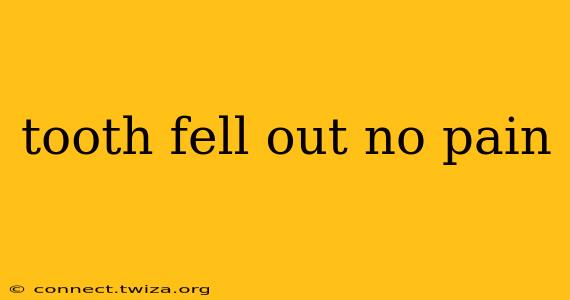Losing a tooth can be alarming, especially when it happens without any pain. While a painless tooth loss might seem less serious than one accompanied by throbbing agony, it's crucial to understand the potential causes and take appropriate action. This comprehensive guide will explore the various reasons why a tooth might fall out painlessly and outline the steps you should take.
Why Did My Tooth Fall Out Without Pain?
The lack of pain when a tooth falls out often indicates a pre-existing condition that weakened the tooth's structure over time. Several factors can contribute to this:
Severe Gum Disease (Periodontitis):
This is a leading cause of tooth loss. Periodontitis involves a severe infection of the gums, which destroys the supporting tissues and bone that hold teeth in place. Over time, the infection weakens the periodontal ligaments, leading to tooth loosening and eventual loss without significant pain. The lack of pain is often because the nerves supplying the tooth have already been damaged by the disease.
Dental Abscess:
An abscess is a pus-filled pocket that forms around the root of a tooth due to infection. While abscesses are usually painful, in advanced stages, the infection can destroy so much of the tooth structure that the tooth falls out with minimal or no pain. The nerve might be compromised, reducing the sensation.
Loose Tooth Due to Injury:
A previous injury to the tooth, perhaps a sports injury or a fall, might have compromised the tooth's root structure. The tooth may have loosened gradually over time, eventually falling out without significant pain, especially if the nerve was damaged in the initial injury.
Bone Loss:
Bone loss around the tooth, often associated with aging or gum disease, can weaken the tooth's support system. This can result in tooth mobility and eventual loss without substantial pain. The gradual weakening often prevents acute pain.
Weak Tooth Structure:
Certain medical conditions or treatments (like radiation therapy) can weaken tooth enamel and dentin, making teeth more susceptible to decay and fracture. This can ultimately lead to tooth loss without significant pain, particularly if decay occurs on the root or the tooth fractures without affecting the nerve.
What Should I Do If a Tooth Falls Out Painlessly?
1. Save the Tooth: If possible, gently rinse the tooth with saline solution (or water if saline isn't available) and attempt to reinsert it into the socket. If reimplantation isn't feasible, store the tooth in milk or saline solution and seek immediate dental attention.
2. Contact Your Dentist Immediately: A painless tooth loss is still an emergency. Your dentist can determine the underlying cause, address the infection (if present), and discuss treatment options, which might involve dental implants, dentures, or bridges.
3. Manage Swelling and Bleeding: Gently apply pressure with a clean gauze pad to control any bleeding. Over-the-counter pain relievers might provide relief from any minor discomfort.
4. Antibiotics (Potentially): If an infection is suspected, your dentist may prescribe antibiotics to prevent further complications.
Frequently Asked Questions (FAQ)
Can a loose tooth fall out without pain?
Yes, a loose tooth can fall out without pain, especially if the supporting structures are severely compromised due to gum disease or bone loss. The lack of pain might be because the nerve has already been damaged.
Is it normal for a tooth to fall out without pain?
No, it's not normal for a healthy tooth to fall out without pain. Painless tooth loss is usually a sign of an underlying dental problem that requires professional attention.
What causes a tooth to fall out unexpectedly?
Unexpected tooth loss is often caused by severe gum disease (periodontitis), advanced dental abscesses, significant bone loss, previous injury, or a weakened tooth structure.
What are the long-term consequences of a tooth falling out?
Losing a tooth can lead to further bone loss, shifting of adjacent teeth, difficulty chewing, and speech impediments. It also affects the overall appearance of your smile. Replacement is often advisable to restore function and aesthetics.
How can I prevent tooth loss?
Maintaining excellent oral hygiene (brushing twice a day, flossing daily), regular dental checkups and cleanings, and a healthy diet are crucial in preventing tooth loss. Addressing gum disease promptly is also essential.
This information is for general knowledge and does not constitute medical advice. Always consult a qualified dentist for diagnosis and treatment of any dental concerns. Early detection and intervention can significantly improve the outcome and prevent further complications.
